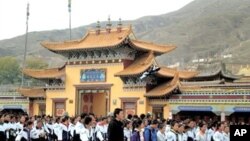Tibetan students in western China are reported to be back at school after they carried out protests over unconfirmed plans to use the Chinese language exclusively in classes.
Witnesses reported calm Wednesday, one day after several thousand Tibetan middle and high school students in China's western Qinghai province protested reports that schools would be required to teach in Mandarin only.
Witnesses say the protests were peaceful and that police did not interfere.
Stephanie Brigden is with the advocacy group Free Tibet, which has been in contact with witnesses in Qinghai. She says the authorities did not interfere in the protests possibly because they did not know what to make of them.
"I think partly the police and the military were unclear on the nature of the protests," she noted, "so, historically we have seen the police reacting with disproportionate force when Tibetans have made demands for the Dalai Lama to return, for Tibetan independence. But this protest was very much led on what you could arguably call a soft issue of language, so it is very unclear how the police should respond to that."
Schools in Tibetan areas use Mandarin and Tibetan alongside each other. Teachers have told news organizations that they have received no orders to switch to Chinese entirely.
Qinghai officials had no immediate comment on the latest protests, but the Qinghai government earlier this month published a document calling for the need to promote a bilingual system.
Brigden says the public fear that Tibetan language would be cut from schools shows the gulf of credibility between official rhetoric and what Tibetans actually hear on the ground.
"I think this is a good example of the difference between what is promised and what is delivered. This is the case, whether we are talking about education rights, whether we are talking about who is benefiting from development in Tibet, or we are talking about whether torture takes place in Tibet," Brigden said.
The issue of adequately promoting minority languages is sensitive in China, where ethnic Han Chinese make up more than 90 percent of the population. The Chinese government has for decades promoted Mandarin Chinese as a way of unifying a diverse country. Many Tibetans say they have little choice but to learn Mandarin if they want to get ahead in modern China.
Modern Chinese art expert Li Xianting learned of the Tibetan language deficiency when he recently helped organize an exhibition of contemporary Tibetan art in Beijing.
Li says he was very surprised when one of the young Tibetan artists, who was literate in Tibetan because his parents were professors, told him some of the other Tibetan artists were not writing Tibetan words correctly.
He says it is not fair to Tibetans that they do not get enough instruction in their own language. He says he thinks globalization should mean multiculturalism, not the eradication of local cultures.
Tibetan Students Protest Alleged Plan to Use Mandarin Exclusively in Class




